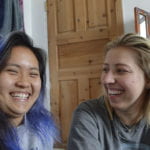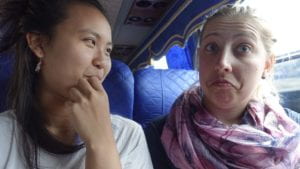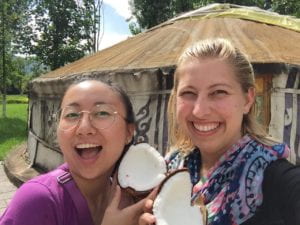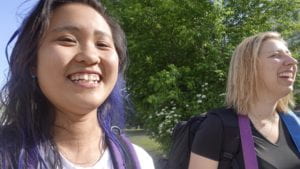Race: From St. Petersburg to Shanghai
One of the things that first attracted me about traveling the Trans-Siberian Railroad was investigating Russia as both a European and Asian country. In St. Petersburg, my whiteness allowed me to blend in, while as we travelled east to Beijing I became progressively more the other. But while visiting friends in China, I was happy to find that I wasn’t foreign to everyone.
Melody and I in Tsetserleg.
Most of my previous international travel has been in Asia, where my blonde hair, blue eyes, and long nose immediately mark me as a foreigner. I’m used to children pointing at me, staring at my strangeness in either delight or fear. So it’s a new experience for me to arrive in Russia and hear people tell me that I look like a native. People speak to me in Russian, forcing me to make awkward “X” signs with my arms to show I don’t understand. Still, in Russia I feel less intrusive. If I get rid of my heavy backpack and walk around the streets of St. Petersburg or Moscow, no one will know I don’t belong. Melody, too, could be Russian, due to her apparent resemblance to the Buryat Mongols in eastern Russia.
Melody and I with Anton and Nika in Moscow.
As we travel east across Russia, the demographics slowly change from predominantly white to more Central Asian. In Ulan-Ude the scale finally tips, with a roughly 60-40 split between people who look Asian versus white. Melody and I excitedly note a number of mixed-race couples holding hands in the streets, but conclude that we are the cutest mixed-race pair. Still, in Ulan-Ude it’s not odd that I’m white—when children talk to me they laugh because I can’t speak Russian, not because I look funny.
The cutest mixed-race couple.
But once we reach Mongolia, I’m foreign again. Even so, the hostel where we stay in Tsetserleg is full of tourists, and on our two-day homestay with local nomads I don’t feel any more out of place because I’m white—again, it’s the language barrier that is more noticeable. The people with whom we stay are used to foreigners, and don’t make comments about my appearance. Instead, I watch each and every Mongolian we meet approach Melody and ask her if she is Mongolian. I swear, even the children ask. It seems Melody has the kind of face and bearing that make everyone think she is one of them—she says she’s been claimed by Mongolians, Thai, Filipinos, and Chinese people as one of their own.
It’s not until we arrive in China that the full weight of my other-ness sets in. Suddenly back in an environment where I am the only non-Chinese person in the crowd, I become aware of how different I look. The almost mannish width of my shoulders. The wideness of my hips and ribcage. My curviness versus the slender frames of everyone around me. I hate that it takes only a day in East Asia before all my body insecurities, which fall away in America, return in full force. But more importantly, I dislike the fact that in Asia I often feel like an invader. Maybe it’s an odd kind of white guilt, but in rural areas I actually feel guiltyfor disturbing the peace and attracting attention with my different appearance. I travel with my Chinese-American high school friend Helen, and everyone assumes that she’s from northern China (she’s not, her parents are from Sichuan). When a girl says something about how odd it is for a Chinese person and a foreigner to be friends, I launch into a spiel about how we’re both Americans and how Americans can look like anyone. This causes confusion rather than a nuanced understanding of ethnicity vs. nationality, but then again the girl is nine.
I look like a native in western Russia, but I’m definitely a foreigner in China. For no matter how good my Chinese is, I will always be an outsider. Helen tells me this is how she feels in the American South. “Why do you think I never go south of Virginia?” she asks me. The thought makes me uncomfortable—it’s one thing for me to feel out of place in a different country, but it makes me sad to be reminded that she often feels out of place in her own country. It’s unfair. But that’s the reality for many Americans.
Helen and I went to an ‘Ethnic Minority Park’ in Yunnan and found this rather dilapidated Mongolian ger. The park was essentially a theme/amusement park that we found alternately entertaining and problematic.
***
I travel with my Chinese-American boyfriend in Beijing and Shanghai, and it amuses me to watch people’s reactions when they realize we’re a couple. One particularly obvious elderly couple poke each other, mouths literally agape, and stare at us openly. Little girls dart their eyes from our intertwined hands back up to my face. But my personal favourite reaction is from a man on the top of the Great Wall who looks at us, smirks, and nods approvingly as if to say ‘Nice.’
Today I met a grandmother and a baby in the lobby of my hotel. The baby stared at me with wide brown eyes, and the grandma laughed. “Look at that Auntie!” she said.
“He’s probably thinking ‘What kind of person is this?’” I reply in Mandarin, approaching the two of them.
“What’s different about her?” she asks the six-month-old baby.
“Is it my blue eyes? Or my blonde hair? Or my long nose?” I asked the baby, pointing to each body part in turn. When it’s children who think I look funny, I don’t mind so much. The baby leans forward and grabs my nose with a soft pudgy hand, smiling with an open mouth. It reminds me of how I was fascinated by my own parents’ noses when I was very little. They would pretend noses made sounds in proportion to their size–theirs emitting deep honks and mine a high-pitched beep.
But thankfully, as odd as I feel being white in public, it turns out not to matter much in private. In Beijing, I meet my boyfriend’s aunt and uncle for the first time, and they don’t make me feel white or foreign at all. Instead they embrace me as a new member of the family, feeding me Sichuan hotpot, helping me buy a new telephone number, and accompanying me to the train station when it’s time for me to leave.
My boyfriend’s uncle and I are walking to the metro when a man calls out to us in Chinese.
“Uncle, you’ve found yourself a foreign friend!” he says, leering suggestively.
“No, no,” replies my boyfriend’s uncle. “She’s my niece. My niece.” I am deeply touched, but I don’t say anything. Instead, I’m quietly grateful that at least for the people immediately surrounding me, I’m not foreign.
Melody and I after an adventurous shower experience.




